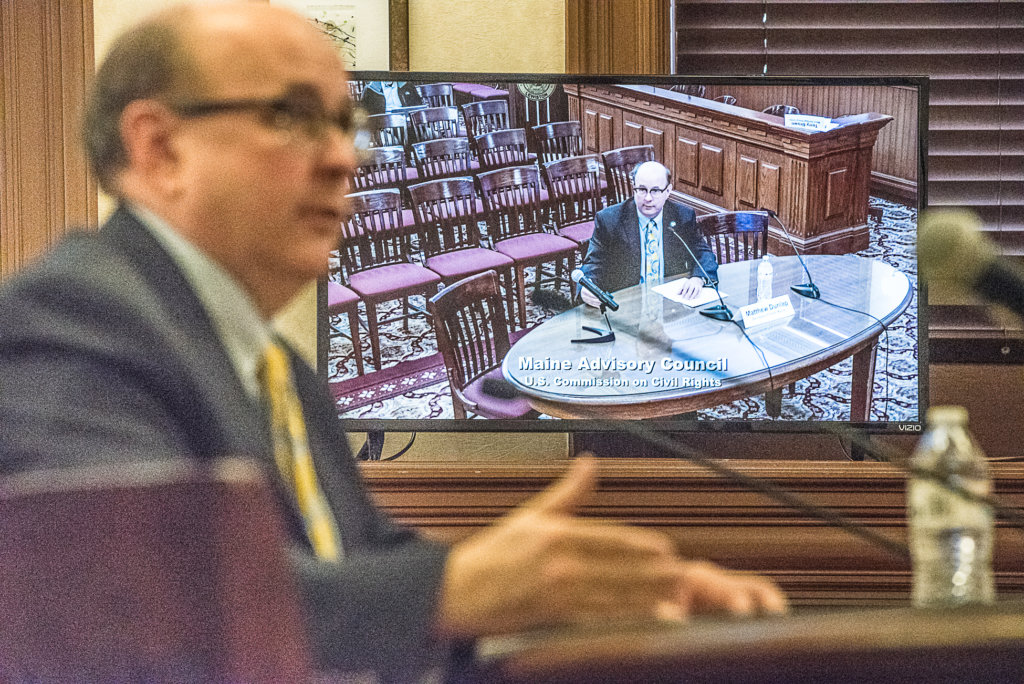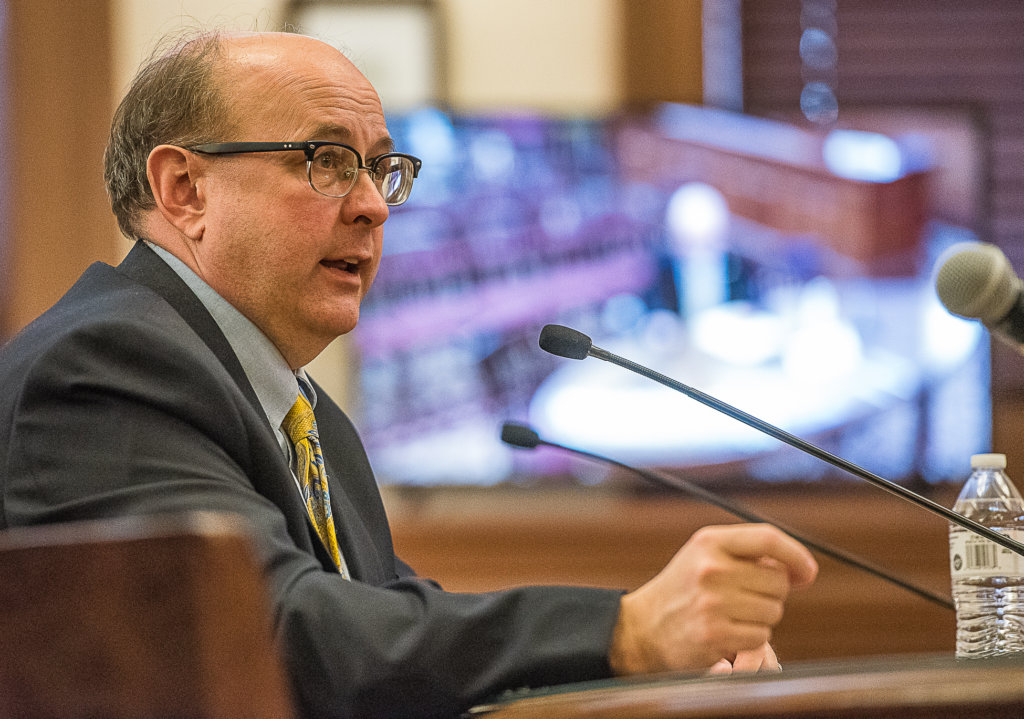LEWISTON — Panelists, including Maine Secretary of State Matthew Dunlap, assured a state advisory committee Wednesday that elections in Maine are secure, and that voting laws in Maine are among the most “protective” when it comes to voting rights.
The testimony from Dunlap and others came during a daylong public briefing on voting rights, presented by the Maine Advisory Committee to the U.S. Commission on Civil Rights.
The advisory committee will submit its findings in a report to the federal commission, which is studying voting rights.
“Our efforts could not be more timely,” Diane Khiel, chairwoman of the advisory committee, said prior to the briefing.
Khiel said the U.S. Senate Intelligence Committee issued recommendations Tuesday to secure elections from foreign attacks, including using paper ballots and securing voter databases.
Dunlap told the committee Wednesday that Maine is already doing all of the things recommended Tuesday, and that he has been in on classified discussions with federal intelligence agencies about cyberthreats.
He said Maine uses paper ballots and felt-tipped pens, not computer touchscreen balloting that leaves some states vulnerable. Maine has also upgraded the security of its online voter database, which Dunlap said would be most likely to be targeted in a potential cyberattack.
“I’m not a computer person,” Dunlap said, “but even I find myself gasping in horror at the thought of only having an electronic record to back up your elections.”
During the 2016 election, he said they told town clerks to keep their own voter files updated on a memory stick outside the online database.
But, he said, “As well as we do, and as hard as we work, we shouldn’t pat ourselves on the back.”
Committee member Carl Toney said he was reassured by Dunlap’s comments about Maine’s system, but asked Dunlap what still concerns him regarding voting rights and election security.
“There’s no end of concern,” he said. “The danger is ignoring it, with some of the bad actors who are out there. We know our systems are secure, but nothing is perfect.”
Dunlap and other panelists from organizations such as the League of Women Voters of Maine, the Maine Heritage Policy Center, and ACLU of Maine also discussed ranked-choice voting, voter ID laws, college students voting and voter intimidation efforts.
Multiple references were made to a recent letter sent from Lewiston Mayor Shane Bouchard to new registered voters, which was criticized as voter intimidation.
Bouchard issued his letter to all 221 people who registered to vote at the polls during last year’s election and mayoral runoff. In it, he laid out the state’s requirements for when someone declares residency in Maine, including getting a Maine driver’s license and vehicle registration.
In response, Dunlap sent a letter to Lewiston officials questioning the need and intent behind Bouchard’s notice, and calling it “a rather awkward way to welcome new residents to a community.”
During the briefing, Dunlap referred to the letter as causing a local “kerfuffle,” but other panelists on Wednesday condemned Bouchard’s letter further.
“It carried the implicit message to those using same-day registration — mostly students — that they are under heightened scrutiny,” said Ann Luther, past president of the League of Women Voters of Maine.
Zachary Heiden, legal director for the ACLU of Maine, said, “There’s no dispute that drivers in Maine must comply with motor vehicle laws, but there’s nothing in those laws that bear upon someone’s eligibility to vote in Maine, and the only purpose in linking the two is to intimidate voters into thinking they’re going to be the object of heightened law enforcement interest.”
Dunlap said the issue of college students voting in local elections has been “a hornet’s nest” in recent years. But he said in the 12 years he’s been on the job, there have been two votes that were suspect, and investigations determined it was merely confusion among an older voter.
Committee member Paul Robertson said Bouchard’s letter “probably stirred up more contentious feelings than it satisfied.”
The U.S. Commission on Civil Rights, established by the Civil Rights Act of 1957, is an independent, bipartisan agency charged with advising the president and Congress on civil rights and reporting annually on federal civil rights enforcement.
There are 51 state Advisory Committees that offer perspective on civil rights concerns at state and local levels.
While Maine is one of 18 states that does not have a law requiring a photo identification at the polls, legislation is routinely proposed. Gov. Paul LePage introduced a bill this session calling for such a law, which was debated by the organizations Wednesday.
Terry Brown, communications director for the Maine Heritage Policy Center, said his organization supports a voter ID law. It would balance protecting the rights of voters while protecting from “systemic fraud,” he said.
Brown said the proposed law would allow voters who do not have an ID to cast a provisional ballot and have three business days to follow up with local town clerks. He said the law would also provide funding to the Secretary of State’s office to issue special IDs to voters who need them.
Luther said voter ID laws are proven to suppress voter turnout, even though the majority of those people would be able to provide sufficient identification.
Asked by committee member Rachel Talbot Ross if there was any evidence of voter fraud, Brown said he did not have any data, but he said there are “challenges to the integrity of the system that we believe an ID would help prevent.”
Brown said his group is also opposed to ranked-choice voting, which he said is unconstitutional.
During his testimony, Dunlap said the recent people’s veto to the Legislature’s decision to delay the system, gave Dunlap’s office 99 days to implement a new system “that’s never been done on this scale. But frankly we’re all quite excited about the whole prospect.”
“We think it’s going to be a big success come June,” he added.
Khiel said the committee normally selects issues that are “current and relevant to our state.” However, she said, the voting rights issue is a specific focus of the federal commission this year, and several states like Maine “will look at the issue and report back to the commission to compile all results.”
The group has recently investigated human trafficking in sex and labor in Maine, racial disparities in prosecution and sentencing, and the criminalization of persons with mental illnesses and reported back to the U.S. Commission on Civil Rights on each issue. The voting rights issue is unique in that the commission is required to conduct an annual statutory report. This year, it is studying voting rights.
“Voting is the foundation of our government and our way of life,” Khiel said. “We do not have a say in the decisions that affect our lives without the right to vote.”

Matthew Dunlap, Maine’s secretary of state, addresses a public briefing Wednesday afternoon on voting rights, at Lewiston City Hall. The gathering was organized by the Maine Advisory Committee to the U.S. Commission on Civil Rights. (Andree Kehn/Sun Journal)

Matthew Dunlap, Maine’s secretary of state, addresses a public briefing Wednesday afternoon on voting rights, at Lewiston City Hall. The gathering was organized by the Maine Advisory Committee to the U.S. Commission on Civil Rights. (Andree Kehn/Sun Journal)
Comments are no longer available on this story